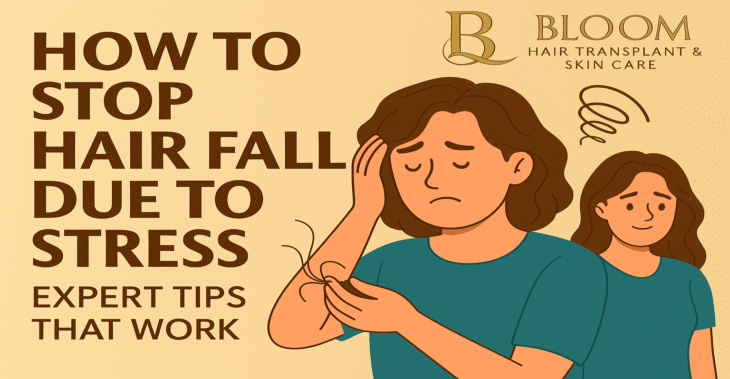
How to Stop Hair Fall Due to Stress – Expert Tips That Work
Stress is a silent factor behind many health problems – and hair loss is one of the most visible signs. If you’ve recently noticed increased shedding during exams, a busy work season, or emotional challenges, you might be wondering: “How to stop hair fall due to stress?” The good news is that stress-related hair loss is usually temporary and reversible when treated correctly.
At Bloom Hair Transplant Clinic, we see many patients struggling with hair loss linked to stress, and with the right approach, most can regain healthy, strong hair. Let’s answer the most common questions.
How Does Stress Cause Hair Fall?
Stress affects the body in more ways than one. When you’re under prolonged emotional or physical stress, it disrupts the normal hair growth cycle. Here’s how:
- Telogen Effluvium: Stress pushes hair follicles into the resting (telogen) phase, leading to excessive shedding after a few months.
- Hormonal Imbalances: Stress raises cortisol levels, which can interfere with normal hormone regulation, triggering shedding.
- Poor Lifestyle Choices: Stress often leads to poor sleep, unhealthy diets, or smoking – all of which worsen hair health.
This explains why many people suddenly notice clumps of hair falling out weeks or months after a stressful event.
How To Stop Hair Fall Due To Stress?
Stopping hair fall due to stress requires a combination of lifestyle changes, proper hair care, and, in some cases, professional treatment. Here are expert tips that work:
- Practice Stress Management
- Yoga, meditation, or deep breathing can reduce cortisol levels.
- Regular physical activity improves blood flow to the scalp.
- Eat a Balanced Diet
- Add protein-rich foods like eggs, nuts, and fish.
- Include iron, Vitamin D, and zinc to strengthen follicles.
- Improve Sleep Quality
- Aim for 7–8 hours of sleep daily.
- A regular sleep schedule helps regulate hormones.
- Gentle Hair Care Routine
- Avoid tight hairstyles, excessive heat styling, or harsh chemicals.
- Use mild, sulfate-free shampoos to reduce scalp irritation.
- Stay Hydrated
- Drinking enough water supports scalp and hair follicle health.
If you’re still experiencing persistent shedding despite these changes, it’s important to consult a specialist.
How To Control Hair Loss Due To Stress In The Long Term?
Many people ask: “How to control hair loss due to stress permanently?” The key lies in consistency. Stress may come and go, but building resilience helps protect your hair long term.
- Maintain a regular exercise routine to regulate hormones.
- Identify stress triggers such as overwork, academic pressure, or emotional issues.
- Seek therapy or counselling if stress feels overwhelming.
- Consider scalp treatments like PRP (Platelet-Rich Plasma), which stimulates dormant follicles and supports regrowth.
At Bloom Hair Transplant Clinic, we combine medical treatments with lifestyle advice to help patients control stress-related hair loss effectively.
Relief Techniques For Your Stress
If you’re looking for faster relief, here are some immediate steps:
- Scalp Massage: Improves circulation and reduces tension.
- Supplements: Biotin, omega-3 fatty acids, and multivitamins may help.
- Medical Support: Dermatologists can prescribe topical minoxidil or oral medications depending on your condition.
While these don’t work overnight, many patients see improvement within 3–6 months when followed consistently.
Is Stress-Related Hair Loss Reversible?
Yes, most stress-induced hair loss is temporary and reversible once the stress is managed. Unlike genetic balding, hair follicles remain alive and capable of regrowth. Recovery typically takes:
- 3–6 months for shedding to slow down
- 6–12 months for noticeable regrowth
For those with chronic stress or combined causes (like genetics and stress), professional intervention may be needed for the best results.
When Should You See A Specialist?
If you notice:
- Hair shedding lasting more than 6 months
- Thinning patches or bald spots
- Excessive hair on pillows, drains, or brushes daily
Clinics like Bloom Hair Transplant Clinic in Mumbai provide advanced diagnostics to determine if your hair loss is purely stress-related or linked to other conditions like hormonal imbalance, genetics, or scalp disorders.
Early intervention ensures better results – whether through PRP, medications, or advanced transplant options.
Regain Your Hair and Confidence
If you’ve been searching for answers on how to stop hair fall due to stress, remember: the key is a holistic approach. Manage stress, improve lifestyle habits, and seek professional care if shedding continues.
At Bloom Hair Transplant, we specialise in helping patients control stress-related hair fall and restore natural, healthy hair growth. Whether you need medical guidance, advanced treatments, or a transplant, our team is here to support your journey to confidence.

